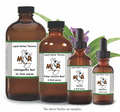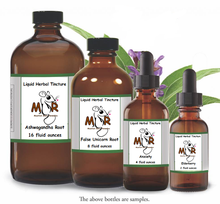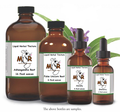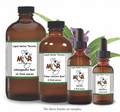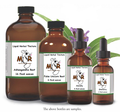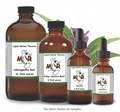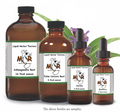 Loading... Please wait...
Loading... Please wait...- Home
- Herbal Tinctures
- Herbal Tinctures - Combination
- Neuropathy & Nerve Pain Support Tincture
Neuropathy & Nerve Pain Support Tincture
Product Description
Neuropathy & Nerve Pain Support
Living with nerve pain can be a long-term proposition. Some neuropathic pain gets better with treatment or on its own, but that can take months or years. Other nerve pain stays the same for years or worsens slowly. Some nerve pain can't be reversed.
Neuropathy is a term that refers to general diseases or malfunctions of the nerves. Nerves at any location in the body can be damaged from injury or disease. Neuropathy is often classified according to the types or location of nerves that are affected. Neuropathy can also be classified according to the disease causing it. (For example, neuropathy from the effects of diabetes is called diabetic neuropathy.)
Types of Neuropathy
Peripheral neuropathy: Peripheral neuropathy is when the nerve problem affects the nerves outside of the brain and spinal cord. These nerves are part of the peripheral nervous system. Accordingly, peripheral neuropathy is neuropathy that affects the nerves of the extremities- the toes, feet, legs, fingers, hands, and arms. The term proximal neuropathy has been used to refer to nerve damage that specifically causes pain in the shoulders, thighs, hips, or buttocks.
Cranial neuropathy: Cranial neuropathy occurs when any of the twelve cranial nerves (nerves that exit from the brain directly) are damaged. Two specific types of cranial neuropathy are optic neuropathy and auditory neuropathy. Optic neuropathy refers to damage or disease of the optic nerve that transmits visual signals from the retina of the eye to the brain. Auditory neuropathy involves the nerve that carries signals from the inner ear to the brain and is responsible for hearing.
Autonomic neuropathy: Autonomic neuropathy is damage to the nerves of the involuntary nervous system. These nerves that control the heart and circulation (including blood pressure), digestion, bowel and bladder function, the sexual response, and perspiration. Nerves in other organs may also be affected.
Focal neuropathy: Focal neuropathy is neuropathy that is restricted to one nerve or group of nerves, or one area of the body.
Neuropathy Causes
Nerve damage may be caused by a number of different diseases, injuries, infections, and even vitamin deficiency states.
Diabetes: Diabetes is the condition most commonly associated with neuropathy. The characteristic symptoms of peripheral neuropathy often seen in people with diabetes are sometimes referred to as diabetic neuropathy. The risk of having diabetic neuropathy rises with age and duration of diabetes. Neuropathy is most common in people who have had diabetes for decades and is generally more severe in those who have had difficulty controlling their diabetes, or those who are overweight or have elevated blood lipids andhigh blood pressure.
Vitamin deficiencies: Deficiencies of the vitamins B12 and folate as well as other B vitamins can cause damage to the nerves.
Autoimmune neuropathy: Autoimmune diseases such as rheumatoid arthritis, systemic lupus, and Guillain-Barre syndrome can cause neuropathies.
Infection: Some infections, including HIV/AIDS, Lyme disease, leprosy, and syphilis, can damage nerves.
Post-herpetic neuralgia: Post-herpetic neuralgia, a complication of shingles (varicella-zoster virus infection) is a form of neuropathy.
Alcoholic neuropathy: Alcoholism is often associated with peripheral neuropathy. Although the exact reasons for the nerve damage are unclear, it probably arises from a combination of damage to the nerves by alcohol itself along with the poor nutrition and associated vitamin deficiencies that are common in alcoholics.
Genetic or inherited disorders: Genetic or inherited disorders can affect the nerves and are responsible for some cases of neuropathy. Examples include Friedreich's ataxia and Charcot-Marie-Tooth disease.
Amyloidosis: Amyloidosis is a condition in which abnormal protein fibers are deposited in tissues and organs. These protein deposits can lead to varying degrees of organ damage and may be a cause of neuropathy.
Uremia: Uremia (a high concentration of waste products in the blood due to kidney failure) can lead to neuropathy.
Toxins and poisons can damage nerves. Examples include, gold compounds, lead, arsenic, mercury, some industrial solvents, nitrous oxide, and organophosphate pesticides.
Drugs or medication: Certain drugs and medications can cause nerve damage. Examples include cancer therapy drugs such as vincristine (Oncovin, Vincasar), and antibiotics such as metronidazole (Flagyl), and isoniazid (Nydrazid, Laniazid).
Trauma/Injury: Trauma or injury to nerves, including prolonged pressure on a nerve or group of nerves, is a common cause of neuropathy. Decreased blood flow (ischemia) to the nerves can also lead to long-term damage.
Tumors: Benign or malignant tumors of the nerves or nearby structures may damage the nerves directly, by invading the nerves, or cause neuropathy due to pressure on the nerves.
Idiopathic: Idiopathic neuropathy is neuropathy for which no cause has been established. The term idiopathic is used in medicine to denote the fact that no cause is known.
This Tincture will provide your body with all the nutrients it needs to support healthy nerve function and help relieve the symptoms of neuropathy. Each ingredient has been carefully chosen to address the various complications of nerve damage.
So lets stop the sharp pins-and-needles pain that attacks your feet make life miserable, and all the time wasted on worrying about your health get you nowhere. It can start to feel out of your control…With expensive medication only providing a band-aid to these symptoms and sometimes making them worse, many are left to accept this condition. We don’t think they should have to.
Made from natural ingredients without gluten, dairy products, preservatives, artificial flavoring, water filler, dyes, or coloring.
With regular use, most of our customers report noticeable improvements in the first week or two (some sooner!) with continued, gradual improvements thereafter.
Ingredients: White Willow Bark, Turmeric Root, Devil’s Claw Root, Skullcap Herb, Passionflower Leaf, Spirulina Algae (Omeg-3 & Omega-6), Corydalis Root, Feverfew and certified organic grain alcohol.
This herbal tincture contains Corydalis Rhizome (Yan Hu Suo) which is an herb that helps treat chronic nerve pain. According to Dr. Ray Sahelian, a medical doctor, nutrition expert and author, corydalis, also known as Corydalis yanhusuo or Corydalis bulbosa, is an herb used in traditional Chinese medicine to treat health problems including allergies, cardiovascular conditions, cataracts, inflammation and pain. Dr. Sharol Tilgner, a naturopathic physician and author of the book "Herbal Medicine From the Heart of the Earth," states that corydalis is related to the opium poppy. Corydalis has some of the same pain-relieving and sedative properties of the opium poppy, although it is milder in action than opium. Sahelian states that Corydalis yanhusuo may have potential clinical value for treating mild to moderate pain. Before taking corydalis to help to stop your chronic nerve pain, talk with your doctor about possible side effects and proper dosage.
The tincture will arrive in a 2 or 4 fluid ounce amber glass bottle with black dropper. Please read bottle label for recommended dosage and read the information mailed with your tincture. Take with water. Shake well prior to use. To maximize shelf life please store upright in a cool, dark location.
Suggested: As a dietary supplement take 10 drops (1/4 tsp or 1.23ml) 1-3 times a day or as needed. Take with a full glass of water and make sure you drink 5-8 ounce glasses of water throughout the day.
Disclaimer: These products are not intended to diagnose, treat cure or prevent any disease. Reviews are not intended as a substitute for appropriate medical care or the advice of a physician or another medical professional. Actual results may vary among users. Mountain Maus Remedies LLC makes no warranty or representation, expressed or implied, as to the accuracy or validity of the information contributed by outside product review submissions, and assumes no responsibility or liability regarding the use of such information. The information and statements regarding the dietary supplements have not been evaluated by the Food and Drug Administration. If you have a medical condition or disease, please talk to your health care provider. If you are currently taking a prescription medication, you should work with your health care provider before discontinuing any drug or altering any drug regimen, including augmenting your regimen with any herb or dietary supplements. Do not attempt to self-diagnose any disease or ailment based on the reviews and do not use the information contained herein for diagnosing or treating a health problem or disease. Proper medical care is critical to good health. If you have a health concern or suspect you have an undiagnosed sign or symptom, please consult a physician or health care practitioner.








